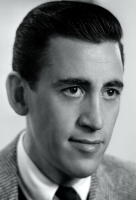| J. D. Salinger | |
| 杰罗姆·大卫·塞林格 | |
| Birth Place: | 美国纽约城 |
|
Read works of Jerome David Salinger at 小说之家 | |
Salinger published several short stories in Story magazine in the early 1940s before serving in World War II. In 1948, his critically acclaimed story "A Perfect Day for Bananafish" appeared in The New Yorker, which became home to much of his later work.
The Catcher in the Rye was published in 1951 and became an immediate popular success. Salinger's depiction of adolescent alienation and loss of innocence in the protagonist Holden Caulfield was influential, especially among adolescent readers. The novel was widely read and controversial.[a]
The success of The Catcher in the Rye led to public attention and scrutiny. Salinger became reclusive, publishing new work less frequently. He followed Catcher with a short story collection, Nine Stories (1953); a volume containing a novella and a short story, Franny and Zooey (1961); and a volume containing two novellas, Raise High the Roof Beam, Carpenters and Seymour: An Introduction (1963). His last published work, a novella entitled "Hapworth 16, 1924," appeared in The New Yorker on June 19, 1965. Afterward, Salinger struggled with unwanted attention, including a legal battle in the 1980s with biographer Ian Hamilton and the release in the late 1990s of memoirs written by two people close to him: Joyce Maynard, an ex-lover; and Margaret Salinger, his daughter.
